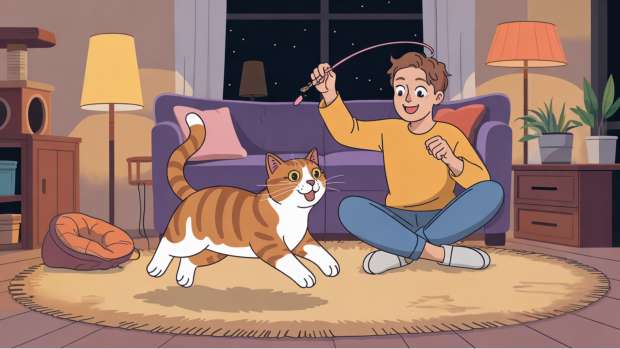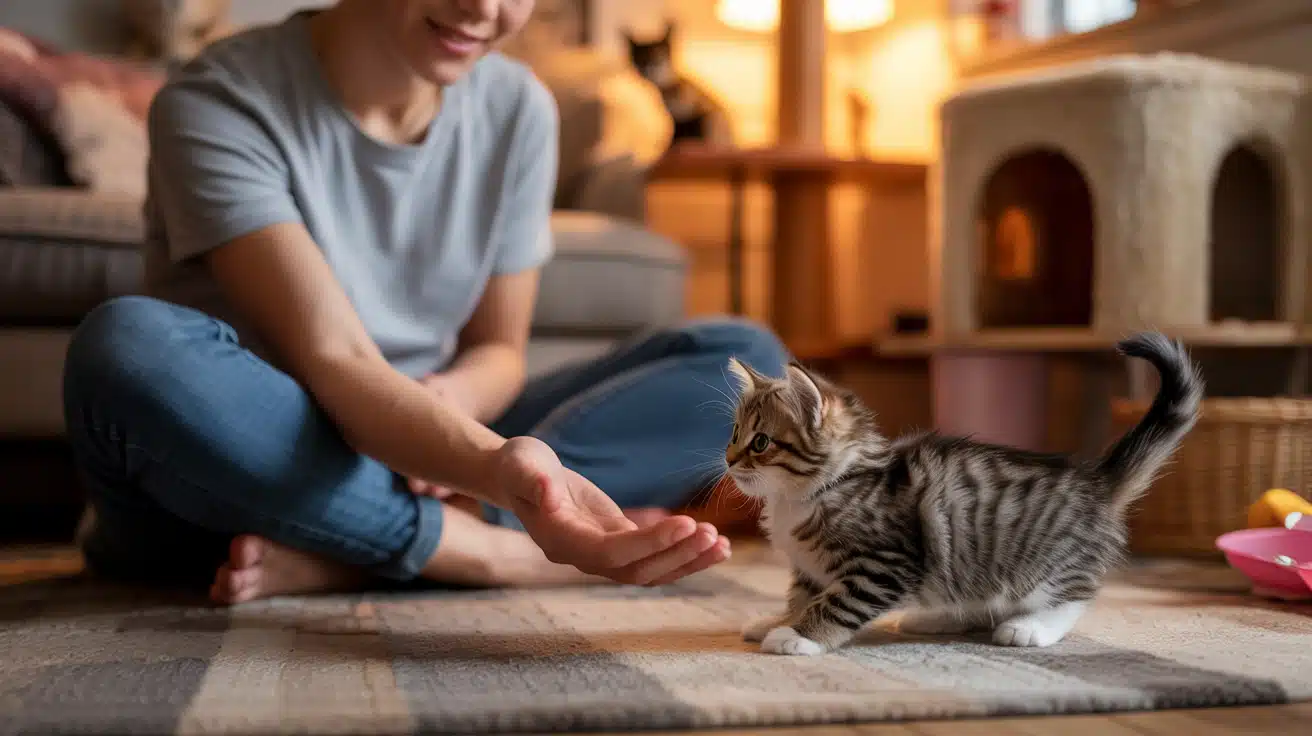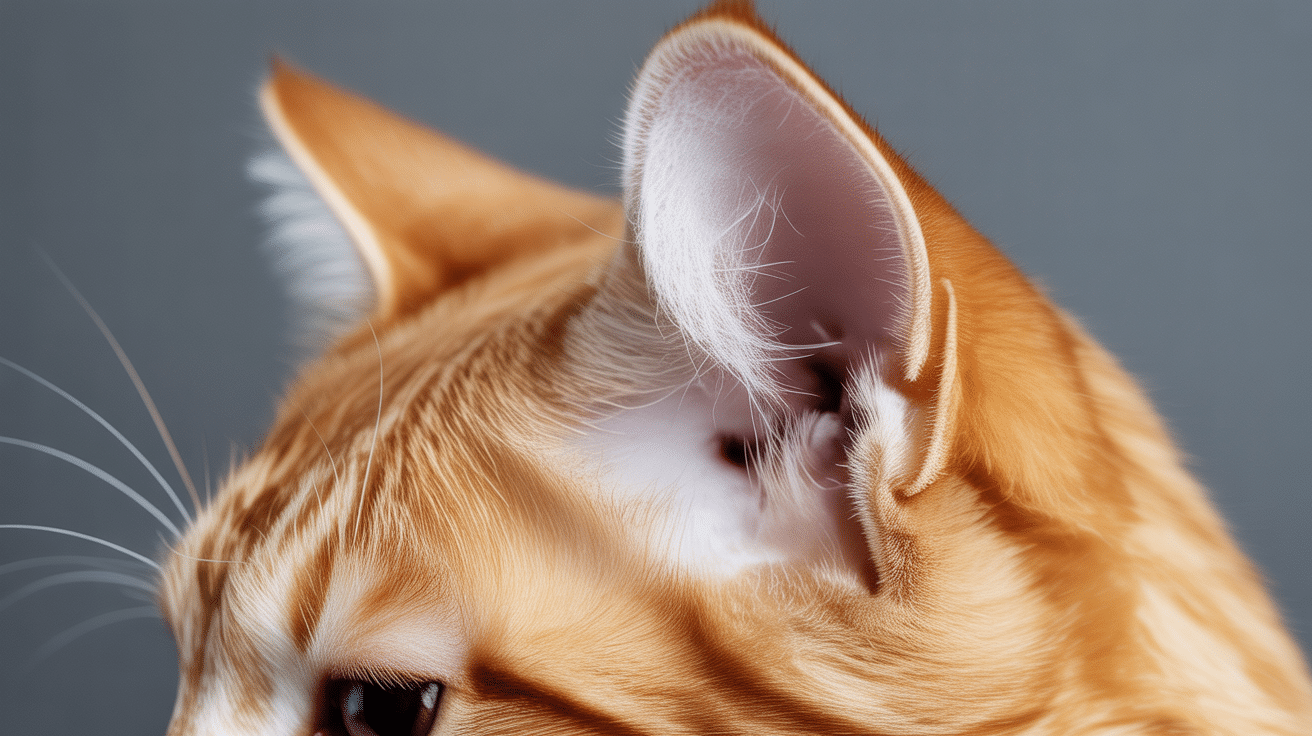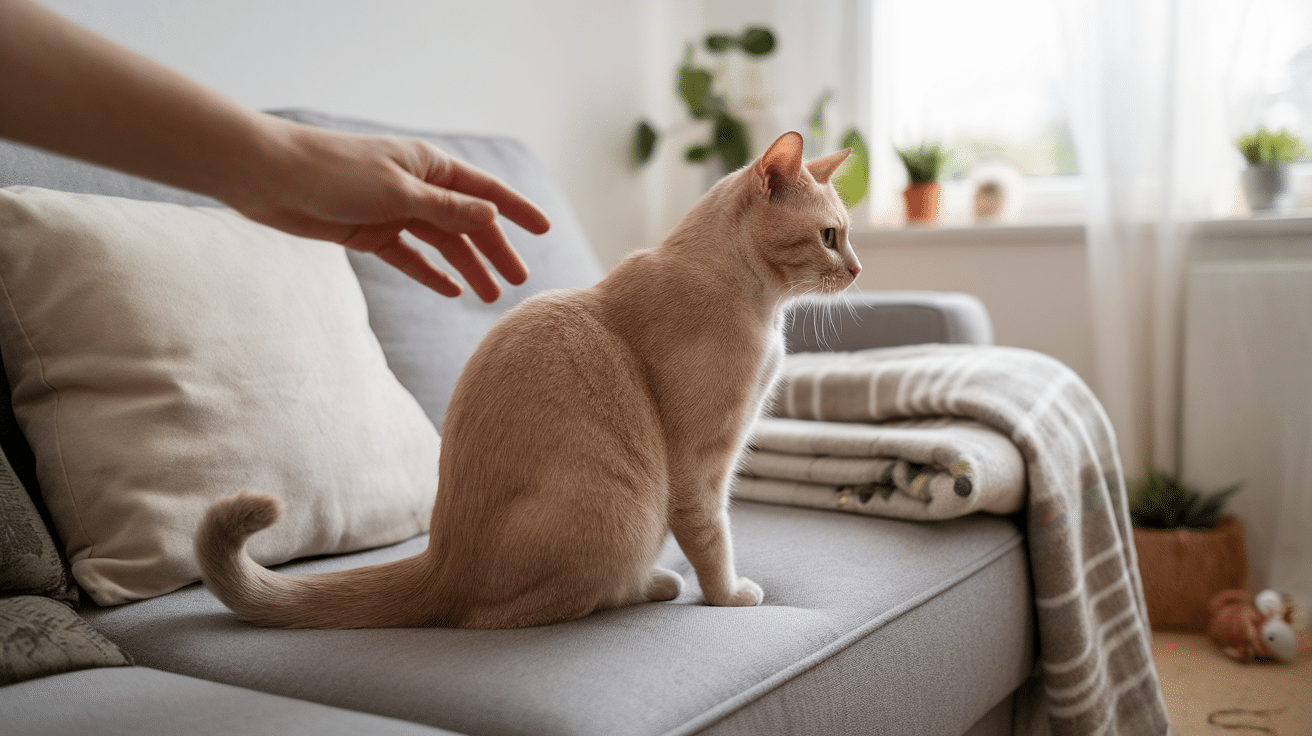Have you ever wished your kitten would curl up in your lap instead of racing off to play? You’re not alone, many new cat parents feel a bit sad when their fluffy friend seems more interested in toys than cuddles.
The good news? Most kittens can learn to enjoy being close to you. It just takes understanding, patience, and the right approach.
In this guide, you’ll learn simple ways to help your kitten feel safe with you. We’ll cover everything from reading your kitten’s unique personality to creating cozy spots they’ll love.
By the end, you’ll have practical tips to try today that could help turn your independent kitten into a loving lap cat who seeks out your touch and company.
Understanding Your Kitten’s Personality
Getting to know how your kitten thinks and acts will help you build a better bond with them. Each small cat has its own likes, dislikes, and ways of showing love.
Let’s look at what makes your fuzzy friend tick.
Every Cat is Different
Cats have their own unique traits, just like people do. Some kittens enjoy alone time and don’t want cuddles often. This doesn’t mean they don’t like you – it’s just their nature.
When you bring a kitten home, watch how they act and what they like. Changing what you expect based on your cat’s personality will make both of you happier.
Early Socialization and its Long-Term Impact
The best time to start handling your kitten is between 4 and 8 weeks old. During this time, their brains are growing quickly, and they learn what’s safe and what’s scary.
Kittens who get lots of gentle handling and positive attention early on are more likely to enjoy cuddles later. These good first meetings with humans build trust that lasts.
Let me create the next section for your blog post:
Building Trust Through Gentle Interaction
Getting your kitten to enjoy cuddles takes time and patience. Small steps each day will help your furry friend feel safe with you. Remember that trust is earned, not given – your kitten needs to learn that being close to you feels good.
Frequent, Gentle Handling
Try to hold and pet your kitten for short periods several times a day. Keep these moments calm and positive. Most kittens feel comfortable when you scratch under their chin or stroke along their back.
Don’t rush the process – your kitten will let you know when they want more attention. Think of trust as a small plant that grows stronger with daily care.
Use of Calm Voice and Routine
Speak to your kitten in a soft, low voice when you’re around them. Use their name often so they connect it with good things. Your voice can be very soothing to a nervous kitten.
Setting up regular times for feeding, playing, and cuddling helps your kitten feel secure. When cats know what to expect, they worry less and relax more with you.
Respecting Boundaries: The Consent Test
Always check if your kitten wants to be touched. Offer your hand and see if they come forward or rub against it. If they back away or flatten their ears, give them space.
Watch for signs like tail flicking, skin twitching, or trying to move away. These tell you your kitten needs a break. Respecting these signals shows you care about how they feel.
Creating a Cuddle-Friendly Environment
Your home needs to feel like a safe place where your kitten can relax completely. Cats don’t open up in spaces that make them feel on edge.
With a few simple changes, you can make your home a place where your kitten feels secure enough to snuggle.
Make Your Space Feel Safe
Cats need hiding spots and high places to feel truly safe. Set up a cat tree or clear off a bookshelf where your kitten can climb up and look down at their world. This helps them feel in control.
Create quiet corners with soft bedding where your little friend can relax when life gets too loud. When your kitten knows they can always find safety, they’ll be more willing to seek you out for comfort and warmth.
Think about noise levels too – sudden loud sounds can make even the bravest kitten nervous. Keep the TV volume reasonable and try not to slam doors or make sharp noises that might scare them.
Use of Scent and Familiar Items
Cats understand the world through smell. A blanket or toy that carries your kitten’s scent helps them feel at home anywhere in the house. Try moving their favorite sleeping blanket to your lap sometimes.
Consider using Feliway diffusers in your home. These release calming cat pheromones that can help your kitten feel more relaxed. Many cat owners notice their pets become more open to cuddles when they are used.
Your own scent matters too. Leave a worn t-shirt in your kitten’s bed so they connect your smell with comfort. This builds a bridge between their safe space and you.
Encouraging Affection Through Play and Reward

Building a loving bond with your kitten happens through fun moments and gentle praise. When you mix playtime and treats with quiet cuddle sessions, you’re teaching your furry friend that being close to you feels good in many ways.
Playtime Builds Bonds
Playing with your kitten does more than just tire them out – it creates happy feelings that they’ll connect with you. Try wand toys that let you control the action while staying at a comfortable distance for shy kittens.
After a good play session, many kittens enter a calm, satisfied state where they’re more open to gentle petting. It’s like they need to burn off extra energy before they can relax and enjoy being held.
I’ve noticed with my own cats that the ones who play with me most often are also the ones who seek out cuddles later. That shared fun creates a special link between you.
Positive Reinforcement
When your kitten shows any sign of wanting closeness, like sitting next to you or stepping onto your lap, reward them right away. Small treats, a happy but quiet “good kitty,” or a gentle scratch in their favorite spot tell them they’ve done something you like.
Start handling your kitten’s paws gently during calm moments. Touch one paw briefly, then give a tiny treat. This teaches them that having their paws touched leads to good things, which helps with future nail trims and vet visits.
Timing matters with rewards. Try to give the treat or praise while the good behavior is happening, not after your kitten has already moved away.
Helping Your Kitten Grow Confident and Social
A confident kitten is often a cuddly kitten. When your small friend feels good about the world around them, they’re more likely to seek comfort in your arms. Building their bravery takes time, but the payoff is a cat who chooses to be close to you.
Early Exposure to People and Everyday Noises
Let your kitten hear the vacuum, doorbell, and TV at low levels. This helps them learn these sounds are normal, not scary.
Having friends visit can help your kitten get used to new people. Ask guests to let your kitten come to them first, not the other way around.
Rituals and Daily Traditions
Start a morning hello or bedtime snuggle with your kitten. These small daily moments add up to big trust over time.
Try offering a tiny treat on your lap at the same time each day. Your kitten will begin to look forward to this special time with you.
When you stick to these small habits, your kitten learns that being with you is a normal, happy part of each day.
Special Considerations for Timid or Older Kittens
Not all kittens warm up to people at the same speed. Some need extra care and patience before they feel safe enough for cuddles.
Understanding your kitten’s background and feelings can help you adjust your approach in ways that work better for both of you.
Adjusting the Approach
Older or shy kittens often have past experiences that make them careful around people. Give them quiet spaces to watch you from a distance.
Try sitting on the floor and reading a book. This lets your timid friend study you without feeling pressure to interact.
Small steps matter – celebrate when your shy kitten takes even tiny moves toward more trust.
Health and Comfort Matter
A kitten who feels sick or hurts somewhere won’t want cuddles. Watch for changes in how your kitten acts or moves around.
Regular vet check-ups catch problems early. Fresh water, clean litter, and good food keep your kitten feeling their best.
A comfortable cat is more likely to seek out your lap for those special bonding moments you both enjoy.
Training Tools that Help
Sometimes we all need a little extra help when working with our furry friends.
These simple tools can make a big difference in how your kitten feels about being close to you. Think of them as stepping stones toward the cuddly relationship you’re hoping for.
Scent-Based Aids
These products copy the good-feeling smells cats make when they feel safe. They can help calm a worried kitten.
Plug in a diffuser in rooms where you spend the most time with your kitten. Many cat parents see their pets relax more within days.
Toys that Encourage Cuddling
Heated stuffed toys can teach your kitten that warmth and softness feel good. Later, they may seek those feelings from you.
Try a snuggle buddy toy with a heartbeat sound. This reminds kittens of their mother and littermates.
Schedule and Routine Building
- Morning: Short 5-minute gentle petting while your kitten eats breakfast.
- Afternoon: 10-minute play session followed by treats on your lap.
- Evening: Quiet time together with calm petting before bed.
Conclusion
Growing a loving bond with your kitten takes time and gentle care. Each small step builds trust between you two.
We’ve looked at many ways to help your kitten feel safe with you, from watching their body signals to making your home cozy and calm. We’ve talked about how play can lead to cuddles and why sticking to daily routines matters.
The most important thing to remember? Let your kitten set the pace. Some cats warm up quickly, while others need weeks or months to fully trust.
Keep using these tips with a patient heart. The quiet moments when your once-shy kitten finally chooses your lap for a nap will feel like the best reward in the world.





